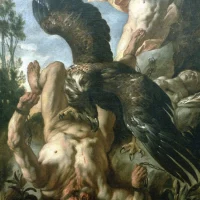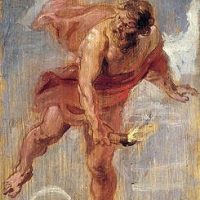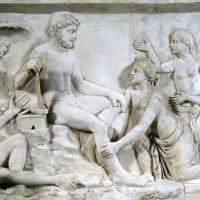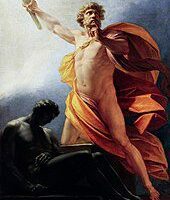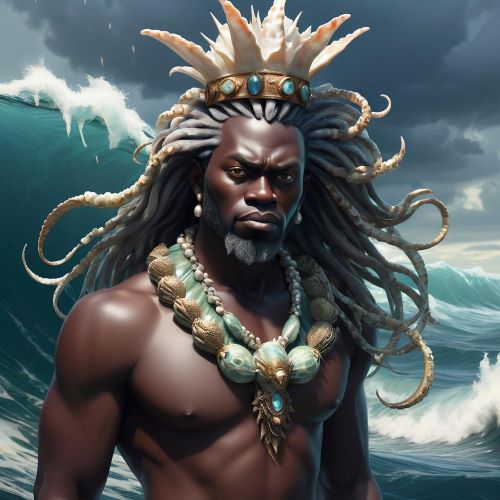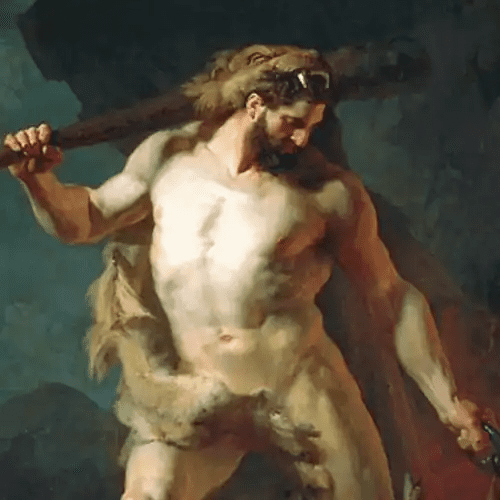Prometheus : The Fire Giver
Listen
At a glance
| Description | |
|---|---|
| Origin | Greek Mythology |
| Classification | Demigods |
| Family Members | Iapetus (Father), Clymene (Mother), Atlas, Epimetheus (Brothers), Deucalion (Son) |
| Region | Greece |
| Associated With | Giving Fire, Foretelling the future |
Prometheus
Introduction
Prometheus, a prominent figure in Greek mythology, is renowned for his bold act of acquiring fire from the gods and bestowing it upon humanity—an act often hailed as one of the earliest expressions of rebellion against divine authority. This daring deed has etched Prometheus into the annals of history as a symbol of intellectual defiance and mankind’s relentless thirst for enlightenment. Reverberating through the ages, Prometheus’s tale blends elements of audacity and altruism, captivating minds across epochs.
Synonymous with defiance and the pursuit of knowledge, Prometheus emerges as a towering presence in Greek mythology, a Titan of formidable power predating even the Olympian gods. His narrative weaves together themes of creation, rebellion, and enduring retribution, rendering him a figure of intricate complexity and enduring symbolism.
Physical Traits
Prometheus, as a Titan, embodies an imposing and robust presence in mythology. Often depicted holding a torch or surrounded by flames—a symbolic nod to the fire he liberated from the gods—his physical appearance varies across artistic renditions. While descriptions of his stature and countenance lean towards grandeur and nobility, the specifics are open to interpretation. Artists depict him with features that convey resilience, intellect, and determination, evident in the gleam of his eyes and the hint of a fiery spirit. Unlike the idealized beauty attributed to Olympian deities, Prometheus’s portrayal is characterized by ambiguity.
Some artists present him as a formidable figure, with a commanding presence, characterized by a long beard and a resolute expression. Others portray him as a figure of suffering, his form marked by the toll of his eternal punishment. Within the realm of mythology, there exists no consistent depiction of Prometheus’s physical form beyond his Titan heritage, which inherently suggests strength and endurance. This ambiguity offers fertile ground for artistic interpretation, enabling creators to emphasize either his defiance or his enduring plight.
Family
Prometheus, born of the Titan Iapetus and the nymph Clymene, emerges from a lineage steeped in mythological splendor. His brothers include Atlas, condemned to bear the weight of the heavens, and Epimetheus, renowned for his penchant for hindsight. Within this familial tapestry, Prometheus stands as a figure of particular prominence, his actions leaving an indelible mark on the fates of gods and mortals alike. While his siblings carve their own narratives within the annals of mythology, it is Prometheus whose deeds resonate most profoundly, underscoring the intricate web of connections that binds the cosmos together.
Prometheus’ parentage links him to a lineage of Titans and Oceanids, beings of immense power and significance within Greek mythology. Among his siblings are Atlas, burdened with the weight of the celestial spheres, and Epimetheus, known for his impulsive nature. This familial connection extends further, as Prometheus counts among his nephews and nieces the Olympian gods themselves. Through his brother Atlas, he becomes an uncle to deities such as Zeus, the king of the gods, and Calypso, the enchantress of the sea. This familial dynamic adds depth to Prometheus’ story, highlighting the interplay between generations and the shifting power dynamics within the pantheon of Greek gods.
Other names
Prometheus derives his significance not only from his deeds but also from the very essence of his name. In Greek, Prometheus translates to “forethought” or “forethought counselor,” a title that presages his pivotal role as humanity’s champion and his strategic machinations in their defense. Throughout history, he has been adorned with various epithets that illuminate different facets of his character and actions. Titles such as “Philomathos” (lover of learning) and “Pyrphoros” (fire-bringer) underscore his insatiable intellectual curiosity and his transformative act of liberating fire for humanity’s benefit.
While Prometheus is predominantly known by his eponymous name, he is also referenced by other epithets that encapsulate his defining traits and accomplishments. Among these, “Prometheus Pyrphoros” (Fire-Bearer) and “Prometheus Pyrkaeus” (Fire-Kindler) stand out, both directly alluding to his audacious theft of fire from the gods. These epithets, intertwined with his primary name, form a rich tapestry that epitomizes Prometheus’ multifaceted nature and enduring legacy in the annals of mythology.
Powers and Abilities
Central to Prometheus’ mythos is his dominion over fire, an elemental force embodying both creation and destruction. Through this gift, he empowers humanity to fashion tools, kindle warmth, and dispel the shadows of ignorance. Yet, Prometheus’ prowess transcends mere pyrotechnics; his intellect serves as a guiding light, steering mortals through life’s labyrinthine paths. His boundless ingenuity and resourcefulness testify to the Titan’s indomitable spirit.
Renowned for his sagacity and foresight, Prometheus wielded a prophetic ability that proved pivotal in his defiance of divine authority. His seminal act, the theft of fire, not only symbolized his role as a harbinger of civilization but also showcased his strategic acumen and cunning. Unlike the Olympian deities, whose power stemmed from divine inheritance, Prometheus derived strength from his astuteness and adept manipulation of circumstances. His prophetic insight, in particular, afforded him a prescient understanding of unfolding events, a formidable asset in his confrontations with Zeus.
Prometheus’s most renowned exploit is undoubtedly the theft of fire from Mount Olympus. In the prevailing rendition of the myth, Zeus had intended to withhold fire from humanity, thus keeping them vulnerable and subservient. However, Prometheus recognized humanity’s latent potential and boldly opposed the king of the gods. Concealing fire within a fennel stalk, he clandestinely transported it from Olympus to bestow upon humanity. This singular act wrought profound transformations, as fire bestowed upon humans warmth, protection, culinary capabilities, and the means to advance metallurgy and craftsmanship. Fire, in essence, ignited the flames of progress and civilization among mortals.
Yet, Zeus perceived Prometheus’s defiance as a direct challenge to his sovereignty, stoking the flames of his wrath. In retribution, the king of the gods meted out a punishment of unparalleled cruelty. Prometheus found himself bound to a desolate mountainside, where each day an eagle would descend to feast upon his immortal liver, perpetuating an unending cycle of agony. Despite the relentless torment, Prometheus’s liver regenerated overnight, subjecting him to perpetual suffering. This grim fate stands as a poignant reminder of the repercussions of defying divine authority and the enduring consequences of disrupting established power structures.
Modern Day Influence
Prometheus, a timeless figure from Greek mythology, continues to cast a profound influence on modern culture. His tale of rebellion against divine authority serves as a potent metaphor for the relentless pursuit of scientific and technological progress, often in defiance of societal norms. Across literature, art, and philosophy, Prometheus symbolizes humanity’s enduring quest for knowledge and advancement, despite the potential consequences. From ancient tragedies by Aeschylus to contemporary science fiction narratives, his story resonates with audiences, inspiring reflections on the human condition and the boundaries of innovation.
In the realm of the arts, Prometheus remains a popular subject, inspiring countless creative interpretations. From classical plays to Romantic paintings, artists have sought to capture the essence of his defiance and the transformative power of his actions. Prometheus’s narrative provides fertile ground for exploring themes of rebellion, sacrifice, and the pursuit of enlightenment, allowing artists to delve into the complexities of human nature and societal progress.
Philosophers, too, have been drawn to Prometheus’s story, grappling with its profound implications for understanding power dynamics, human agency, and the consequences of progress. From ancient Greek philosophers like Plato to modern existentialists like Jean-Paul Sartre, thinkers have engaged with Prometheus’s defiance as a lens through which to examine fundamental questions about the nature of existence and the pursuit of knowledge. Through these philosophical explorations, Prometheus’s legacy endures as a testament to the enduring human spirit and its ceaseless quest for understanding and advancement.
Related Images
Newest addition
Frequently Asked Questions
What is lorem Ipsum?
I am text block. Click edit button to change this text. Lorem ipsum dolor sit amet, consectetur adipiscing elit. Ut elit tellus, luctus nec ullamcorper mattis, pulvinar dapibus leo.
What is lorem Ipsum?
I am text block. Click edit button to change this text. Lorem ipsum dolor sit amet, consectetur adipiscing elit. Ut elit tellus, luctus nec ullamcorper mattis, pulvinar dapibus leo.
What is lorem Ipsum?
I am text block. Click edit button to change this text. Lorem ipsum dolor sit amet, consectetur adipiscing elit. Ut elit tellus, luctus nec ullamcorper mattis, pulvinar dapibus leo.
What is lorem Ipsum?
I am text block. Click edit button to change this text. Lorem ipsum dolor sit amet, consectetur adipiscing elit. Ut elit tellus, luctus nec ullamcorper mattis, pulvinar dapibus leo.
What is lorem Ipsum?
I am text block. Click edit button to change this text. Lorem ipsum dolor sit amet, consectetur adipiscing elit. Ut elit tellus, luctus nec ullamcorper mattis, pulvinar dapibus leo.


